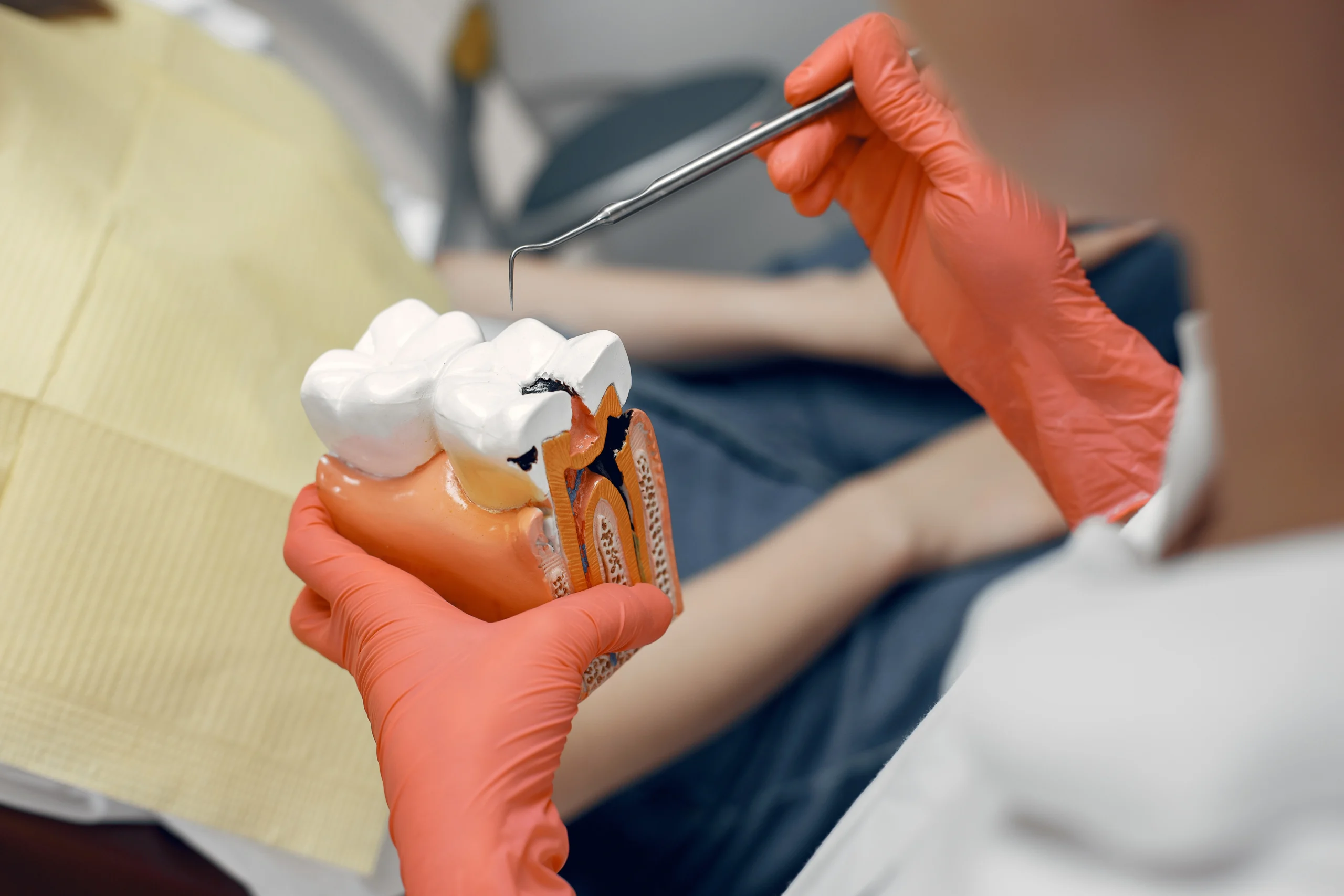Understanding the Causes of Root Canal Treatment
Root canal treatment is often necessary when the pulp inside a tooth becomes inflamed or infected. This pulp, which contains nerves and blood vessels, can become damaged for several reasons, usually related to neglect or injury.
Common Causes of Root Canal Treatment
- Deep decay that has not been treated in time
- Repeated dental procedures on the same tooth
- Cracks or fractures that allow bacteria to reach the pulp
- Injury to the tooth that affects the pulp, even without visible damage
Learning how to avoid root canal treatment starts with understanding these common causes and taking early action to prevent damage.
Daily Oral Hygiene Habits and How to Avoid Root Canal Treatment
The most straightforward way to avoid root canal treatment is through a consistent and effective oral hygiene routine. Good habits reduce the risk of cavities, gum disease, and other problems that can affect the inner parts of the tooth.
Effective daily hygiene practices
- Brushing teeth twice daily with fluoride toothpaste
- Flossing once per day to remove plaque between teeth
- Using a fluoride mouthwash to strengthen enamel
- Replacing toothbrushes every three months
- Scheduling a dental check-up every six months
By maintaining these habits, individuals significantly lower their chances of requiring complex treatments. Learning how to avoid root canal therapy begins with these daily routines.
Why Regular Dental Visits Help Avoid Root Canal Procedures
Routine dental visits play a key role in prevention. Dentists are trained to detect issues early, often before symptoms arise. This allows for simpler treatments that prevent more complex procedures.
Benefits of regular dental check-ups
- Detect early decay using visual checks and X-rays
- Monitor old fillings or crowns for signs of failure
- Identify minor fractures or enamel erosion
- Clean tartar that cannot be removed by brushing alone
Knowing how to avoid root canal treatment includes being proactive with regular check-ups to catch issues early.
Dietary Changes and How to Avoid Root Canals Through Nutrition
Diet strongly influences oral health. Some foods support strong teeth and gums, while others contribute to decay and damage.
Helpful foods for oral health
- Dairy products such as cheese and milk for calcium
- Leafy greens like spinach for minerals
- Apples and celery for natural cleaning and saliva stimulation
- Nuts for essential vitamins and minerals
Foods and drinks to limit
- Sugary items like sweets, fizzy drinks, and baked goods
- Acidic items such as citrus juices and wine
- Sticky foods like dried fruits that cling to teeth
Learning how to avoid root canal therapy naturally includes choosing a tooth-friendly diet and avoiding foods that erode enamel or feed bacteria.
How to Avoid a Root Canal After Dental Injury
Accidents and teeth grinding can damage teeth and lead to pulp exposure. Wearing a mouthguard is an effective way to protect teeth from trauma during sports or sleep.
Types of mouthguards
- Custom-fitted mouthguards: Made by a dentist for maximum comfort and protection
- Boil-and-bite mouthguards: Available over-the-counter and moulded at home
- Standard mouthguards: Least effective due to poor fit
Taking steps to prevent dental injury is an important part of knowing how to avoid root canal treatment caused by physical trauma.
How to Avoid Root Canal in Children With Early Dental Care
Children’s teeth are vulnerable to decay, particularly when oral hygiene routines are not yet established. Starting good habits early helps prevent future dental issues.
Key practices for children
- Brushing twice daily with fluoride toothpaste suited to their age
- Limiting sugary snacks and drinks
- Ensuring regular dental visits from the age of one
- Applying dental sealants to the back molars, where decay often starts
- Supervising brushing until the child can manage it properly
When thinking about how to avoid root canals in children, prevention through early dental care is the most effective solution.
Risky Lifestyle Habits and How to Avoid Root Canal Treatment
Certain behaviours increase the risk of dental damage or decay. Being aware of these habits allows for preventative action to be taken.
Habits to avoid
- Smoking: Slows healing and increases the risk of gum disease
- Heavy alcohol use: Can contribute to dry mouth and enamel erosion
- Chewing ice or pens: May cause fractures in teeth
- Poor hydration: Reduces saliva flow, which helps neutralise acids in the mouth
Modifying these behaviours plays a vital role in understanding how to avoid root canal treatment caused by long-term neglect or wear.
Dental Technology and How to Avoid Root Canal Through Early Diagnosis
Modern dentistry uses advanced tools to catch problems earlier than ever. This allows for timely treatments that avoid invasive procedures.
Common diagnostic technologies
- Digital X-rays: Lower radiation and improved imaging
- Intraoral cameras: Show close-up images of teeth and gums
- Laser diagnostic tools: Detect early-stage decay not visible
When discussing how to avoid root canal therapy, embracing diagnostic technology is a practical step toward prevention.
Dispelling Myths About Root Canal and How to Avoid Unnecessary Treatment
Misunderstandings about root canal treatments can prevent patients from seeking timely care. Addressing these myths helps improve oral health outcomes.
Common misconceptions
- “Root canals are extremely painful”: With modern anaesthesia, most procedures are no more uncomfortable than a filling
- “A tooth without pain doesn’t need a root canal”: Infections can exist without symptoms
- “Extraction is a better option”: Retaining natural teeth helps maintain bite strength and alignment
Understanding the facts is just as important as knowing how to avoid root canal treatment entirely.
Financial Advantages of Knowing How to Avoid Root Canal Treatment
Root canal treatment, especially when combined with a crown, can be costly. Preventive care is significantly more affordable in the long term.
Comparative costs
- Regular cleanings and exams are low-cost and typically covered by insurance
- Fluoride treatments and sealants are inexpensive ways to prevent decay
- Mouthguards, though initially an investment, can prevent costly damage
When people know how to avoid root canals with early care, they’re not only protecting their teeth but also saving on dental expenses over time.
Recognising Early Symptoms and How to Avoid Root Canal Through Timely Care
Some symptoms suggest that a problem is developing. Addressing these signs early can prevent the need for a root canal.
Warning signs of dental problems
- Persistent sensitivity to hot or cold
- Pain when chewing
- Swelling or tenderness in the gums
- A pimple-like bump on the gum
- Tooth discolouration
Knowing how to avoid root canal treatment means acting quickly when these symptoms appear. Early intervention often leads to simpler, more affordable care.
Final Thoughts
Avoiding a root canal is possible with the right information and consistent habits. From early detection and proper hygiene to protective measures and lifestyle changes, each step plays a role in maintaining healthy teeth. Learning how to avoid root canal treatment is not about quick fixes, but long-term, practical decisions that support lifelong oral health. Having regular visits to your dentist can help avoid issues like a root canal. Don’t hesitate to contact us today at Waldron Dental today!
Refercnes













